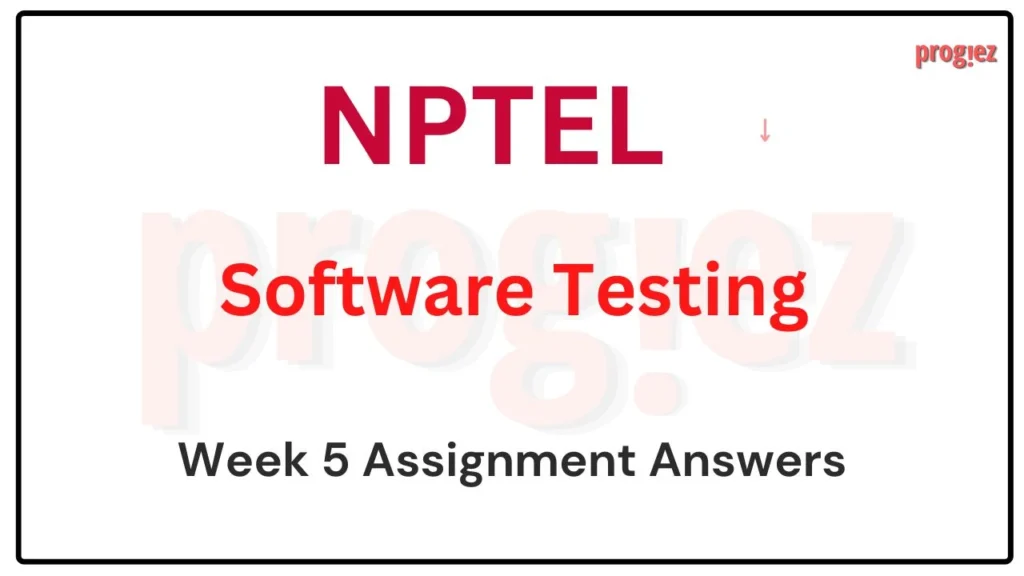Software Testing NPTEL Week 5 Assignment Answers
Are you looking for Software Testing NPTEL Week 5 Assignment Answers? You’ve come to the right place! Access the latest and most accurate solutions for your Week 5 assignment in the Software Testing course.
Table of Contents

Software Testing NPTEL Week 5 Assignment Answers (July-Dec 2025)
Question 1. State true or false: GACC subsumes predicate coverage.
a) True
b) False
Question 2. When we test to check if a particular clause does not determine a predicate, which kind of coverage criteria are we considering?
a) Active coverage criteria
b) Inactive coverage criteria
Question 3. Which of the following represents a correct order of subsumption amongst logic coverage criteria? (In the options below, read → as ‘subsumes’.)
a) Correlated active clause coverage → Predicate coverage → Clause coverage
b) Combinatorial coverage → Predicate coverage → Clause coverage
c) Combinatorial coverage → Correlated active clause coverage → Predicate coverage
d) General active clause coverage → Correlated active clause coverage → Clause coverage
Question 4. Consider the logical predicate p = a ∨ (b ∧ c). Truth table for the predicate is given below with rows numbered from 1 to 8. T represents the Boolean value true and F represents the Boolean value false. Which of the following represents pa, the conditions under which clause a determines p?
a) b ∧ c
b) b ∨ c
c) ¬b ∨ ¬c
d) ¬b ∧ ¬c
Question 5. Which of the following represents pb, the conditions under which clause b determines p?
a) a ∧ c
b) a ∨ c
c) ¬a ∧ c
d) ¬a ∨ ¬c
Question 6. Which of the following represents pc, the conditions under which clause c determines p?
a) ¬a ∧ b
b) ¬a ∨ b
Question 7. Which of the following represents GACC pairs for clause a? (Numbers below represent row numbers from the truth table.)
a) {2,3,4} × {6,7,8}
b) {1,3,4} × {5,6,7}
Question 8. State true or false: GACC pairs for clauses b and c are the same.
a) True
b) False
Question 9. The set {(2,6),(3,7),(4,8)} is the set of RACC pairs for which clause?
a) Clause a
b) Clause b
These are Software Testing NPTEL Week 5 Assignment Answers
Question 10. State true or false: CACC pairs for clauses a, b and c are different from GACC pairs for these clauses.
a) True
b) False
Software Testing NPTEL Week 5 Assignment Answers (July-Dec 2024)
Course Link: Click Here
1. For a given propositional logic formula, if all possible assignments of true/false values to the atomic propositions make the formula evaluate to true, what is the formula called?
a) The formula is a tautology.
b) The formula is a satisfiable formula.
c) The formula is a contradiction.
d) The formula is invalid.
Answer: a) The formula is a tautology.
2. Consider the propositional logic formula φ=p∨q∨r. Which of the following true or false assignments to p, q, and r make the formula φ evaluate to false? In the options below T represents True and F represents False.
a) p=F, q=T, r=F
b) p=T, q=F, r=F
c) p=F, q=T, r=T
d) p=F, q=F, r=F
Answer: d) p=F, q=F, r=F
These are Software Testing NPTEL Week 5 Assignment Answers
3. Which logic coverage criterion tests for all possible assignments of true/false values but can get infeasible due to there being a large number of assignments?
a) Clause coverage
b) General active clause coverage
c) Correlated active clause coverage
d) All combinations coverage
Answer: d) All combinations coverage
4. Which of the following is a correct order of subsumption amongst logic coverage criteria? In the options below, read → as ‘subsumes’.
a) Combinatorial coverage → General inactive clause coverage → Restricted inactive clause coverage
b) Combinatorial coverage → General active clause coverage → Restricted inactive clause coverage
c) Combinatorial coverage → Correlated active clause coverage → Predicate coverage
d) Combinatorial coverage → General active clause coverage → Correlated active clause coverage
Answer: d) Combinatorial coverage → General active clause coverage → Correlated active clause coverage
These are Software Testing NPTEL Week 5 Assignment Answers
5. Consider a predicate p and a clause a in p. When evaluating pa, the conditions under which clause a determines p, if we get a value False, what does this indicate?
a) pa evaluating to False indicates that it is not possible for clause a to determine p.
b) pa evaluating to False indicates that clause a always determines p, irrespective of the truth values of the other clauses.
Answer: a) pa evaluating to False indicates that it is not possible for clause a to determine p.
6. What is pa, the conditions under which clause a determines p?
a) pa = a
b) pa = b
c) pa = True
d) pa = False
Answer: c) pa = True
7. What is pb, the conditions under which clause b determines p?
a) pb = a
b) pb = b
c) pb = True
d) pb = False
Answer: c) pb = True
8. State yes or no: CACC pairs for the clauses a and b are the same as GACC pairs.
a) Yes
b) No
Answer: b) No
9. State yes or no: RACC pairs for the clauses a and b are the same as CACC pairs.
a) Yes
b) No
Answer: b) No
10. State yes or no: RICC tuples for the clauses a and b are not the same as CACC tuples.
a) Yes
b) No
Answer: b) No
These are Software Testing NPTEL Week 5 Assignment Answers
All Weeks of Software Testing: Click here
For answers to additional Nptel courses, please refer to this link: NPTEL Assignment Answers